

How to Teach Students to Use Wikipedia. Tech You Can Do: Research Template You Can Do. For the past 3 weeks, I've shared about doing better Google searches, results, and citations.
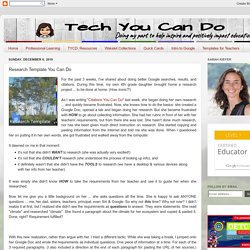
Vetting Social Studies Resources Is Important. And Hard. Here’s How to Do It Well. This article is part of our upcoming guide, Social Studies: It's Time to Reinvest.
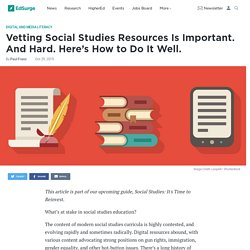
What’s at stake in social studies education? The content of modern social studies curricula is highly contested, and evolving rapidly and sometimes radically. Digital resources abound, with various content advocating strong positions on gun rights, immigration, gender equality, and other hot-button issues. There’s a long history of political disagreement about what social studies classes should study – and even whether to use the term “social studies” at all – as well as what knowledge and skills constitute a high-quality social studies education. Multiple-choice assessments still drive a great deal of what schools teach in social studies, and unfortunately many students become disillusioned with a subject in which accumulating knowledge and memorizing information is emphasized because that’s what counts on standardized tests. Everyone Has Invisible Bias. This Lesson Shows Students How to Recognize It.
Last year, an English teacher at my school came to me with an all-too-common concern about an essay a student named Kyle had just turned in.
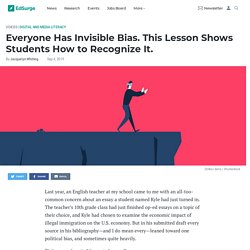
The teacher’s 10th grade class had just finished op-ed essays on a topic of their choice, and Kyle had chosen to examine the economic impact of illegal immigration on the U.S. economy. But in his submitted draft every source in his bibliography—and I do mean every—leaned toward one political bias, and sometimes quite heavily. Lacking Research Skills, Students Struggle. School Librarians Can Help Solve the College Readiness Gap.
School Library Journal. How to Cite Holiday Song Lyrics. Today's news: Real or fake? [Infographic] Bibme. On student scrutiny: two strategies. We’re focusing a lot of attention these days of helping students determine credibility.
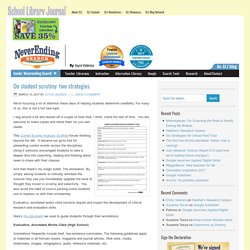
For many of us, this is not a hot new topic. I dug around a bit and dusted off a couple of tools that, I think, stand the test of time. You are welcome to make copies and retool them for you own needs. This Current Events Analysis Scaffold forces thinking beyond the Ws. QuoteItWithMe: the free app for integrating quotes into your writing. The Essential Unique Search Tool Your Students May Have Never Used - November Learning. The Wayback Machine is as basic a reference tool for the Internet Age as a dictionary.
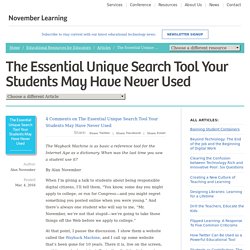
When was the last time you saw a student use it? By Alan November When I’m giving a talk to students about being responsible digital citizens, I’ll tell them, “You know, some day you might apply to college, or run for Congress—and you might regret something you posted online when you were young.” And there’s always one student who will say to me, “Mr. November, we’re not that stupid—we’re going to take those things off the Web before we apply to college.” At that point, I pause the discussion. The audience goes from laughing at me for how naïve I am for not realizing there is a delete button for web content to stunned silence in the blink of an eye. I should really bring paper bags, because some kids are so nervous about the implications of what they’ve just seen, they’re hyperventilating. The Internet Archive, a nonprofit organization whose mission is to index the Web, runs the Wayback Machine.
Edwebet64 - Research. The Advanced Google Searches Every Student Should Know - November Learning. “Did he seriously just ask that?
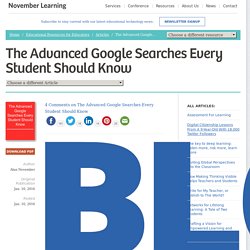
How old is this guy?” Well yes, I recently seriously just asked a group of students if they knew how to search Google. And yes, the students got a good laugh from my question. “Of course I know how to use Google,” I have been told by every student to whom I have asked the question. 11 Ways to Teach Savvy Search Skills. 3.
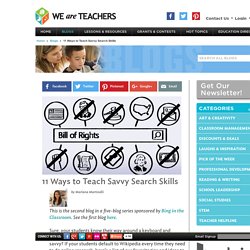
Use the “three-source rule.” When students are doing online research in her class, Je Hen enforces the three-source rule. A Teacher’s Guide to Wikipedia. Wikipedia is often vilified in educational circles.
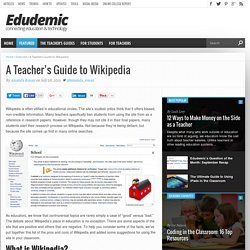
The site’s loudest critics think that it offers biased, non-credible information. Many teachers specifically ban students from using the site from as a reference in research papers. However, though they may not cite it in their final papers, many students start their research process on Wikipedia. Not because they’re being defiant, but because the site comes up first in many online searches. As educators, we know that controversial topics are rarely simply a case of “good” versus “bad.” The name of the site, “Wikipedia,” is a portmanteau of the Hawaiian word “wikiwiki” meaning quick and the English word “encyclopedia.” Through the collaborative process of writing and editing on Wikipedia, users add, delete, and refine information in encyclopedia-like entries.
It’s good for teachers to note that Wikipedia does not censor language and images.